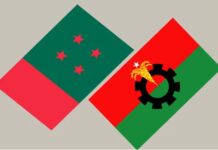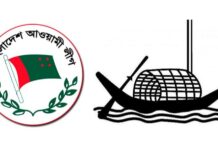Faruque Ahmed
There is a big question as to what is going to happen after October 24. There is a sense of uneasy tension everywhere. Business planning has come to a halt. Investment is drying up as nobody is ready to risk fund in uncertain political climate. Trading in the bourse is nose-diving and capital flight from the country last week surpassed that of any time in the past.
The panic is on the rise as tenure of the Awami League led government will expire on October 24.
The next 90 days are set to hold the parliamentary election in the country and the crisis is brewing because Prime Minister Sheikh Hasina does not want to resign and hand over power to a neutral government to hold a free and fair election. She wants to hold the polls keeping herself in power and the outgoing parliament continuing in office during the election and till the next parliament reconvenes.
The BNP-led 18-party alliance is opposed to such unilateral arrangement while demanding a caretaker government-type non-party government to hold the polls. They said the ruling party is planning to snatch the next election to return Prime Minister Sheikh Hasina to power again. The Prime Minister made no secret either saying the victory of BNP led 18-party alliance will rehabilitate terrorism.
Thus the October 24 is seen as the red line in Bangladesh politics. The government wants to switch to the second phase of the struggle against the country’s anti-liberation forces from that day. BNP is blamed for sheltering anti-liberation forces. In the election the Awami League will use the civil bureaucracy which she has so far lined up, besides using the muscle power under a government run by herself.
Begum Khaleda Zia has therefore asked for resistance to the unilateral electioneering and instructed the 18-party alliance leaders and workers to set up local level committee to foil the polls. She has also reiterated that the opposition will not take part in such an election.
The situation is rapidly turning towards major street confrontation and countrywide violence and bloodsheds. It may even turn towards a civil strife. That fight for illegal control of the country may begin. BNP-led 18-party leaders and other leaders like Bangabir Kader Siddiqui, Badruddoza Chowdhury or Dr. Kamal Hossain has said any government led by Sheikh Hasina after October 24 will be illegal and unacceptable. The government leaders on the other hand said Prime Minister Sheikh Hasina will hold the election in time whether or not any party takes part in it.
News reports said, the major opposition has planned countrywide indefinite shutdown to force the government to bow to people’s demand to a free election under neutral government. There is a fear of total breakdown of law and order. The opposition may organize resistance throughout the country. Inter-district bus and train communication may come to a halt. Members of law enforcing agencies and bureaucracy may be asked to join what BNP leaders say ‘mass upsurge’ to paralyze the administration. Khaleda Zia has already asked for their support in this regard, while Awami League leader Mohammad Nasim has threatened back saying anybody found cooperating with the opposition would be ‘bundled’ back home. There is a growing fear that the capital may see the worst confrontation and even bloody street fighting may ensue to spread to the districts.
The government has already made it clear that it will mobilize BGB and army if needed during election time, besides police and RAB to hold control over the situation. Many people fear the repeat of the street mayhem similar to one that had occurred on October 26, 2006 at city’s Paltan intersection instigated by leftist forces. This time almost all leftist parties are on the Awami League-led grand coalition and there is a growing belief that the government is more under their influence than that of the centrist democratic elements.
There is also a large section of people who tend to believe that the war crime trial of top Jamaat-e-Islami leaders is taking place because the left parties in the country want to eliminate them from politics. But in the process, the country is facing destabilization, its social fabrics are breaking apart and political co-existence of a pluralistic society is fast fading away.
Under the situation the unilateral election move is going to destabilize the country.
The government has so far ignored the pleas of the UN secretary general Ban Ki-moon for a dialogue between the government and the opposition to sort out poll time Government issue. It has also showed cold shoulder to US secretary of state John Kerry’s letter in which he has asked for dialogue. Meanwhile the government’s desperate attempt to destroy the Grameen Bank to punish Prof. Dr. Mohammad Yunus has entered critical phase last week when the government has vested its accountability to the central bank.
On the election front, the Election Commission (EC) has openly sided with the government stance to support a unilateral election. Two Election Commissioners last week said incumbent MPs will be able to contest election keeping the Parliament in office since they don’t hold office of profit.
There is no such precedence in any democracy where the outgoing parliament continues in office until the new parliament reconvenes. It denies level playing field to the opposition. But Election Commissioners in Bangladesh said they can provide level playing field to the opposition candidates by putting in place new stringent code of conduct, but their blind loyalty to the government speaks contrary to it.
Moreover, army may also be deployed, they said last week which the EC had earlier turned down. Many people tend to believe that the EC’s proposal to deploy army may have two targets. In the first place, it may act to placate the opposition which had earlier demanded the deployment of the force. And secondly, when the opposition has given the call to resist the polls, army’s presence will surely work to hold the polls with least violence.
It is true the government may be able to hold a unilateral election. But questions remain whether the new parliament will be sustainable to continue. However, the usefulness of continuing the outgoing parliament lies in the fact that even if the opposition contests elections and wins it, the outgoing parliament may disown it blaming flaws and votes it out. It may create new problem, but these are the lines of defence of the government to bring it back to power again. There are enough intrigues, although people in the country want peace.
Source: Weekly Holiday










Bangla Human Rights Activist Adilur Rahman freed on bail at last after 2 months of torture & intensive interrogation in jail
From Dilwar Nurun Nabi Khan ,Dhaka.11.10.2013.
“After alleged dreadful killing of investigative Journalist couple RUNI-SHAGOR, (When an angry HAsina sais, “ I’M THE PRIME MINISTER OF THE COUNTRY, IT IS NOT MY JOB TO WATCH PEOPLES BED-ROOM”)closing down independent TV channels, imprisoning & torturing country’s best known journalist, the Editor of Daily Amardesh and score of other journalist who had the courage to publish the investigative, factual corruption report of the current government including the universally condemned conspiratorial “SKYPE-GATE” scandal and the publishing of Hasina’s apostate bloggers well planned attack on Islam so far Hasina and her apostates gang, it seems to have been able to get away. But in Human Rights Activist Mr Adilur Rahman’s case (their latest but not last victim) they came under heavy international pressure they could not but respond.
Therefore,Coming under heavy, sustained pressure both from Bangladeshis & international community Hasina’s one-party terrorist government orders its subordinate, executives-controlled politicized court to grant bail to jailed Human Rights activists after 2 months of relentless torture and interrogation.
http://www.MNA.com/www.bdchronicle.com/www.bdinn.com/www.amardesh.com/www.manabzamin.com. Adilur Rahman Khan, secretary of rights organisation Odhikar, was freed from notorious Kashimpur jail on Friday morning after two months of his arrest in a case filed against him under the Information Communication and Technology (ICT) Act. Earlier on Tuesday, the High Court granted six-month bail to Adilur Rahman Khan in the case. On September 4, charge was framed against the rights activist for publishing ‘fake, distorted and defamatory’ information to tarnish the image of this democratically elected government under section 57 (1) (2) of the Information Communication and Technology (ICT) Act.
His organisation ( THE RIGHTS) Odhikar on June 10 published a report, titled ‘Assembly of Hefajat-e-Islam Bangladesh and Human Rights Violations’, claiming that it had collected the names of 61 people killed during the ‘evacuation’ by law enforcers at Shapla Chattar in the city’s Motijheel.On the day, the Information Ministry had written to Odhikar seeking the names and details of the 61 ‘deceased’ persons as claimed in the report, but Odhikar declined to comply.On August 10, plainclothes police arrested Adilur Rahman Khan from near his Gulshan residence. Earlier a Dhaka court rejected a bail petition of Adilur on September 25.